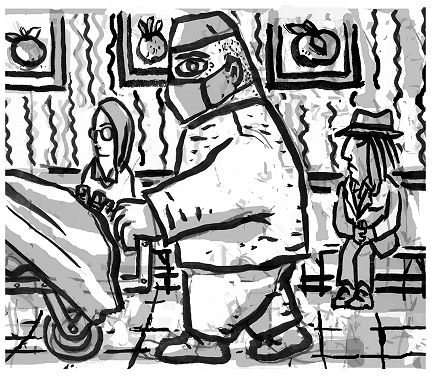| Back to Illustration by Russell Christian. Support Jim Knipfel in Patreon Purchase Jim Knipfel's books:
Copyright Jim Knipfel. All rights reserved. Back to |
Slackjaw by Jim Knipfel Dumb As I LookIt made sense, almost. It was no surprise in any event. Twenty minutes before starting what I was told would be an intense medical examination of my memory skills and cognitive abilities, a teenaged hooligan punched me in the side of the head really hard for no apparent reason. It threw me for a bit of a loop. But the appointment had been scheduled weeks earlier and there was no getting out of it, so I picked myself up and went to the neurologist’s office. A bit of background might be useful here. A few months back, I went to see my neurologist for a routine check up, and to tell him about some persistent, annoying memory problems I’d been having. Not just in terms of forgetting things (I've lost entire years), but also in remembering things wrong. I would remember things that other people had said—most notably Morgan—as something that I had said or thought of myself. Sometimes I’d even stubbornly insist that I was right long after it was clear I wasn’t.
Morgan and I could have a conversation about something, then two days later I would repeat something she’d said almost verbatim thinking it had just occurred to me that moment, having no recollection whatsoever of the earlier conversation. Worse, these things would sometimes find their way into print. Those, and other similarly unpleasant tricks of consciousness prompted me to make that first appointment. It seemed so simple at the time, but it turned out to be the beginning of a 4-month medical roller coaster. This memory test was merely one stop along the way. I was only in the waiting room a few minutes before a neuropsychologist and her assistant led me to a small room in back where we all sat down at a tiny table. “How are you doing today?” she asked. “I just got socked in the head on the subway,” I told her. “Really?” She seemed a little shocked by this. “Yeah,” I said. “Other than that I’m fine.” Then, as the assistant jotted an endless stream of notes on a legal pad, the doctor went on to ask me question after question, collecting one of the most comprehensive medical histories I’ve ever had taken, from the earliest signs of RP and depression, up to and including getting socked in the head. Then, as if that wasn’t tiring enough, for the next three hours, her assistant read me long lists of words, then asked me to repeat them. I was asked to define other words, draw connections between pairs of still other words, and solve a slew of visual logic puzzles. (I didn’t do so hot with those) Then she went back and asked me to repeat that first list of words again. It was all unbelievably draining, especially that soon after being socked in the head. Afterward, I went home, where Morgan had been waiting, and we opened a couple of beers. Things started to seem a little better. About a month later, I received the results of that particular test in the mail. The final report was 5 or 6 pages long, in very small type. After using my responses that afternoon to assess my word knowledge, verbal and non-verbal abstraction, constructional abilities, verbal memory function, fluency measures, and the like, the neuropsychologist concluded that I was grumpy and blind. She also said that I had a flat affect and was right-handed. It wasn’t exactly what I was hoping for—I mean, I already knew those things—but I guess it was on a par with what I’ve come to expect these past few months. Less than a week after receiving those results, I received the results of one of the two recent EEGs I’d undergone. The doctor who ran the tests explained to me that in most normal people, the brain’s alpha waves—sort of a pacemaker to help organize and direct other brainial activity—run on a frequency of about 10 cycles per second. For more intelligent people, he said, that frequency can go up a bit, to 10.2 or 10.5 cycles per second on average, say. “But in your case…” he said. I could tell from his voice this wasn’t going anyplace good. “…In your case they run more around 8.” That wasn’t much of a surprise. “So, um,” I asked, after considering this a moment, “is that just a simple, clinical way of saying I’m stupid?” “Well,” he said, “you’re obviously not stupid.” “Okay then, does it mean I’m getting stupider?” He admitted that he had no idea why this was. The only thing he could say is that sometimes alpha wave frequency can tend to go down when people start getting much older. That didn’t surprise me much, either. To hear doctors tell it, internally, I have the body of a 70 year old. That wasn’t all. The most lively alpha wave activity, he found, was in the occipital lobe, in the back of the brain. And that’s weird because, among other things, that’s the brain’s visual center. He’s not really clear on what any of this means in widescreen, and lord knows I don’t either, but it might possibly just mean that some things are starting to come together in a very interesting and strange way. The last time I saw my neurologist before he sent me off on this long and twisted odyssey of brain tests, he was looking over my family history, trying to draw a connection between RP and cognitive trouble. “Oh, I wouldn’t bother with that,” I told him as he began scouring the secret doctor message boards on the Internet. “The only likely connection you’ll find is in the fact that most people don’t start developing RP until they’re old.” He kept looking, and I rolled my eyes. “You know—they get old, and both dementia and eye troubles kick in.” He said nothing, and kept looking. Two weeks later when I began describing the utter foolishness of this doctor to my ophthalmologist, the sheer unmitigated sillyassitude of his cockamamie idea, she was the one to pooh-pooh me. “No, that actually makes a lot of sense,” she told me, “though I’ve never seen any hard connections drawn. It’s still quite possible.” Then she explained that since the retinas and optic nerve are essentially outgrowths of the brain and comprised of brain tissue, it’s conceivable that when they begin to deteriorate, that deterioration can spread. If it spreads all the way along the optic nerve back to where it connected to the brain (at the occipital lobe), then there you have it, boom! Cognitive troubles up the ying-yang. It’s a possibility anyway. And one I’ve since had other doctors confirm, even if none of them can point to a single study or any research into the matter. Well, that’s enough of the half-assed speculative neurology lesson. It doesn’t really matter, I guess. After some 5,000 years of trying, we still have no real idea how the brain works or why it does what it does. And for all it’s glitches, I suppose mine runs as well as can be expected. In the end, I think it would just be easier to assume and accept that I’m just getting stupider and leave it at that. |




